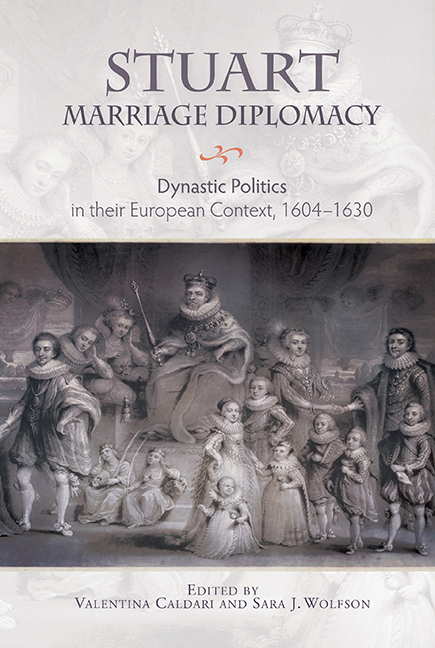Book contents
- Frontmatter
- Contents
- List of Illustrations
- List of Contributors
- Acknowledgements
- List of Abbreviations
- Introduction
- Part One Marriage and the Court
- Part Two Marriage and Politics
- 4 ‘The onely soveraigne medecine’: Religious Politics and Political Culture in the British–Spanish Match, 1596–1625
- 5 James I and the Dissolution of the 1621 Parliament through Spanish Eyes
- 6 War, Diplomacy and Stability in the North of Europe in the Early Seventeenth Century
- 7 The Atlantic Politics of Early Stuart Diplomacy
- 8 Mercantile Diplomacy: Corporations, States and International Negotiation
- Part Three Marriage and War
- Part Four Marriage and News
- Part Five Marriage and Continental Europe
- Part Six Marriage and Ceremony
- Bibliography
- Index
- Studies in Early Modern Cultural, Political and Social History
8 - Mercantile Diplomacy: Corporations, States and International Negotiation
from Part Two - Marriage and Politics
Published online by Cambridge University Press: 24 October 2019
- Frontmatter
- Contents
- List of Illustrations
- List of Contributors
- Acknowledgements
- List of Abbreviations
- Introduction
- Part One Marriage and the Court
- Part Two Marriage and Politics
- 4 ‘The onely soveraigne medecine’: Religious Politics and Political Culture in the British–Spanish Match, 1596–1625
- 5 James I and the Dissolution of the 1621 Parliament through Spanish Eyes
- 6 War, Diplomacy and Stability in the North of Europe in the Early Seventeenth Century
- 7 The Atlantic Politics of Early Stuart Diplomacy
- 8 Mercantile Diplomacy: Corporations, States and International Negotiation
- Part Three Marriage and War
- Part Four Marriage and News
- Part Five Marriage and Continental Europe
- Part Six Marriage and Ceremony
- Bibliography
- Index
- Studies in Early Modern Cultural, Political and Social History
Summary
The English East India Company (EIC) was an organization like no other in England, with privileges regarding the right to make treaties and engage in military activities that were essential for the Company's expansion in Asia. In many respects, this was delegation of sovereignty from the English crown, and the EIC arranged treaties, engaged in military conflict and imposed laws. In Asia, the experience of the Company diplomatically was often through negotiations with states and interested parties in the region with whom they sought to obtain preferential treaties and rights to trade. While much of the historiography has examined the importance of conflict and ‘unequal treaties’ between the Company and Asian states, the diplomacy undertaken by the EIC was far more sophisticated. As Janice Thomson suggests, merchant companies ‘were based on a state-granted monopoly to trade between the home country and regions outside of Europe. Though they were financed largely with ‘private’ capital, they were not private organizations in the modern sense. They possessed military, judicial, and diplomatic power.’ In spite of the substantial powers taken by the EIC, the practice of trade in the East Indies was curtailed to reflect current political necessities for the English crown. While the EIC's charter did state that trade could be conducted anywhere in ‘Asia & Africa & America in any of them beyond the Cape of Bona Esperansa to the Straights of Magellan’, there were limitations. Specifically, it was clear that ‘the same trade must not be undertaken [to any place] already in the lawful & actual possession of any such Christian Princes or States, as at this point or at any time hereafter shall be in League of Amity with us our Heirs or successors.’ This meant that, in theory, the EIC was restricted from opposing other European powers active in Asia, and the crown sought to ensure that its own diplomatic activities in Europe would not be undercut through the EIC's activities in Asia.
In spite of attempts by the crown to restrain the Company, the latter's diplomatic and military efforts were not limited to engagement with Asian states. Competition with other Europeans was a common state of affairs for the EIC.
- Type
- Chapter
- Information
- Stuart Marriage DiplomacyDynastic Politics in their European Context, 1604–1630, pp. 125 - 138Publisher: Boydell & BrewerPrint publication year: 2018



